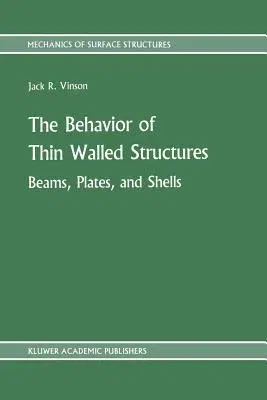This book is intended primarily as a teaching text, as well as a
reference for individual study in the behavior of thin walled structural
components. Such structures are widely used in the engineering
profession for spacecraft, missiles, aircraft, land-based vehicles,
ground structures, ocean craft, underwater vessels and structures,
pressure vessels, piping, chemical processing equipment, modern housing,
etc. It presupposes that the reader has already completed one basic
course in the mechanics or strength of materials. It can be used for
both undergraduate and graduate courses. Since beams (columns, rods),
plates and shells comprise components of so many of these modern
structures, it is necessary for engineers to have a working knowledge of
their behavior when these structures are subjected to static, dynamic
(vibration and shock) and environmental loads. Since this text is
intended for both teaching and self-study, it stresses fundamental
behavior and techniques of solution. It is not an encyclopedia of all
research or design data, but provides the reader the wherewithal to read
and study the voluminous literature. Chapter 1 introduces the
three-dimensional equations oflinear elasticity, deriving them to the
extent necessary to treat the following material. Chapter 2 presents, in
a concise way, the basic assumptions and derives the governing equations
for classical Bernoulli-Euler beams and plates in a manner that is
clearly understood.


